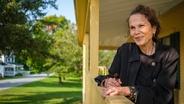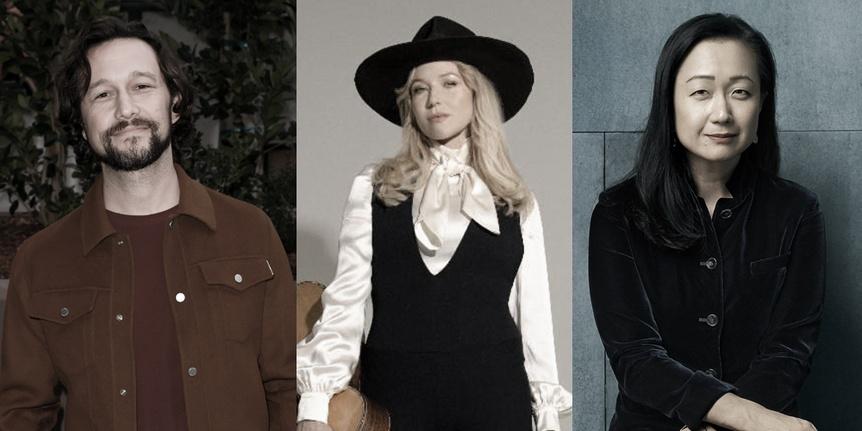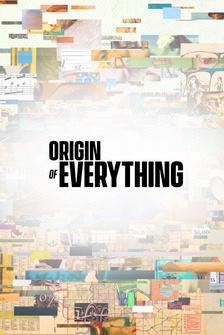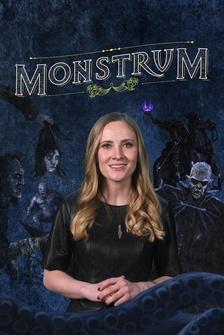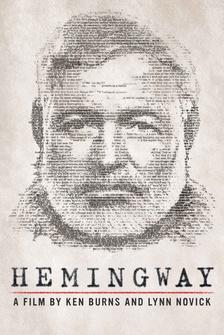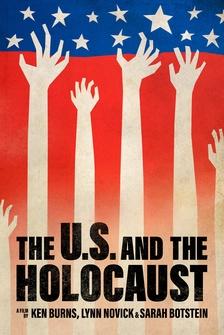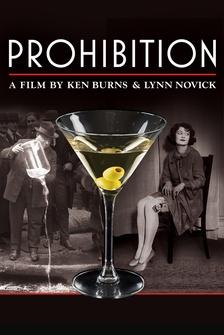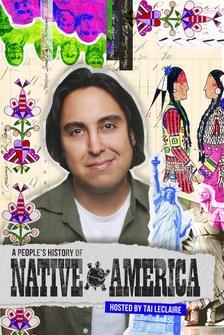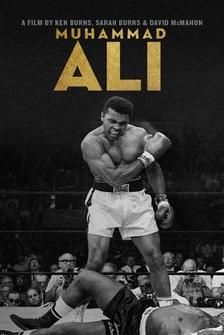♪ ♪ Julia: My string in the labyrinth of my life has always been the storyline, has always been the writing.
When we came to the United States, we left everything behind.
Even our language, our cultures, our families, but I carried the portable world of the imagination.
And that's where I landed.
I landed in that place of story.
And so that's the place that I move and think and feel, and the worlds that I create and that's where I feel most at home.
Announcer: Ms. Alvarez explores themes of identity, family and cultural divides.
She illustrates the complexity of navigating two worlds and reveals the human capacity for strength in the face of oppression.
For extraordinary storytelling, in poetry and in prose, the 2013 National Medal of Arts to Julia Alvarez.
[applause] clap, clap, clap Ramona: Julia's work came to solidify a new identity that was emerging.
This is the moment in which you have a population that was born and raised here and somehow felt that yes, they were from America Latina, but at the same time they had developed something here that was unique.
And that required a new imagination, a new understanding of who we were.
Susan: What she did is she went into the interior and she found the words to express herself, and those stories related to a lot of people.
There are people in Israel who read Julia.
They're in Serbia, Croatia, Japan, China.
I just think there's something that she found in that imagination that's... forgive me, universal.
Julia: We practice an activity which promotes compassion and human understanding.
Elizabeth: There are very few writers of the Latin American diaspora that hold the same weight as her.
It's probably Julia, Isabel Allende, Edwidge Danticat, Sandra Cisneros.
I think that might be the like Mount Rushmore of... of women writers from Latin America who put this literature on the map.
Helena Maria: Julia is an artist.
She's got an aesthetic of her own, that respects what art is and what are can do, and the possibilities of art.
Julia: "I lie on these cold sheets waiting for you."
That doesn't sound right!
Helena Maria: Because she is a poet, the way she writes her fiction is so lyrical and beautiful.
Julia: "I wait on these sheets for your touch."
Oh, I am still not happy with this ending.
I can't get it straight!
Ana: I think Julia is someone that's always striving to be her best self, and she works hard on herself.
She was in search for two things her entire life, as I remember.
She was in search of space, physical-emotional space.
And she was in search of identity.
Manuel: So here was the penthouse and obviously there's no fence here.
None of these high rises.
Your house was there, obviously.
No fences so it was one big yard.
Julia: What do you mean when you say penthouse?
Manuel: Pen house, like the chicken coop.
Julia: Oh, yes, hen house, hen house... Manuel: Hen house.
What did I say?
Julia: Penthouse.
Manuel: No, hen house.
Julia: Penthouse.
Yo no me acuerdo de penthouse.
Manuel: Hahaha.
Female reader: "Back then we all lived side by side "in adjoining houses "on a piece of property "which belonged to my grandparents.
"We lived in each other's houses, "staying for meals "at whatever table we were closest to when dinner was put out."
Julia: That was right when we left, Lynne and I were the same age.
Narrator: In her debut novel, How the Garcia Girls Lost Their Accents, Julia Alvarez re-imagined her family story of immigration and the circumstances that brought to an end an idyllic childhood.
Julia: Oh my God!
That's your brother?
Manuel: No, that's my father.
That's my maternal grandfather.
Julia: Oh my God!
Manuel: And that is my paternal, papito, abuelito, Mama Yaya, mamita.
Julia: Papito was always trying to teach us things.
Take us to the ballet.
Took us to the opera.
Manuel: And the recorders he would give us, and we would start playing music?
Julia: I remember when he brought a 45 thing, with a... who is it that would do the twist?
Manuel: Chubby... Julia: Chubby Checkers!
He said...
He taught us all how to do the twist.
He said... because you know all the grown-ups smoke and they would throw away their butts and we would go.
And he said, "You make believe you are putting out two cigarettes, and put on Chubby Checkers."
It was just dreamy, magical in many ways, and the gift that our elders gave us was to create this world where we felt safe, loved, excited, curious.
It's often surprising to me that we were living in a horrid dictatorship.
Narrator: For 31 years, dictator Rafael Leonidas Trujillo ruled every facet of Dominican life instilling terror in the hearts of the population.
♪ Julia: I remember getting up in the middle of the night to go get water in the kitchen, and Mami and Papi were crouched behind one of the windows.
And I still remember Mami saying, "Are they still there?"
"Who's still there?"
"Ssshh!"
You know, this terror, this terror.
And I thought, "Wait a minute, what's going on?"
The SIM in their little Volkswagens would come and surround the house because father was under suspicion.
Narrator: A lifelong opponent of General Trujillo, Dr. Eduardo Alvarez, had escaped persecution by going into exile in 1937.
In New York City, he married Julia Tavares Espaillat, the daughter of a wealthy Dominican family.
Ana: The first two children were born there, Mauricia and Julia.
And my grandmother was furious.
"How could you keep my daughter like that in a little walkup apartment without any maid?"
Tita: She knew how to rub it in.
Ana: She just guilt tripped him and guilt tripped him.
And so, he went back, and then got involved in the underground movement.
Papi had a ham radio.
He was in touch with Cuba, and with the CIA.
He said whichever one helps us first.
He would let me sit in there when all the men were gathering.
And he would empty out his pockets, with the pennies in his pockets.
And I remember, it's a body memory, sitting on the floor, like playing tiddlywinks with the coins and hearing the men talking about, you know, overthrow of the government.
Female reader: "The doorbell rings, "and Chucha lets in these two creepy-looking men.
"They wear dark mirror glasses.
"What catches Yoyo's eyes are their holster belts "and the shiny black bulge of their guns poking through.
"Chucha talks very loud "and repeats what the men say as if she were deaf.
"She must be wanting Papi to hear "from wherever he is hiding.
"Yoyo wants to cry, too, but she is sure if she does, "the men will get suspicious and take her father away, and maybe the whole family."
Manuel: When did you hear that you were leaving?
Because I remember that all of the sudden you just disappeared.
Julia: Yeah.
Manuel: I don't remember much, you're gone.
Julia: They couldn't tell us.
We weren't told.
And then we came home one day and... Manuel: They said, "Pack your bags?"
Julia: No.
Manuel: Or "Pack your bag."
Julia: Mami dijo, "Vamos pa Boca Chica," because that's where the new airport was, remember?
Manuel: Yeah, yeah.
Julia: And I thought, "Wait a minute, "we're being put in little dresses?
And we're going to Boca Chica?"
Ana: Maury was 11, Julia was 10, Tita was, uh, 9, and I was 5 I remember mother was just trembling, and the plane wasn't taking off.
It was a delay.
There was a delay.
There was a delay.
And the longer it delayed, the more afraid they were becoming.
Tita: I remember the... eh, the anxiety.
And when we got in the plane and the... Ana: Took off, take off.
Tita: Took off.
Mommy and Poppy just hugged each other and cried and cried and cried.
Ana: There was for them a huge relief, and then, of course, a huge loss.
Ana: Mother was a pampered, aristocratic woman who had grown up with a silver spoon.
She had to leave her home and her family and her comforts.
Julia: Papi would've been 45.
He was running a hospital in the DR.
He had quite a reputation.
Professionally established.
And then to start over...
When we first landed, Papi didn't have a medical license.
He was looking for work anywhere.
If he had to clean in a hospital, I mean, it was nothing.
Ana: They rented a two-bedroom apartment, and the three girls got one room, and then it was Mami and Papi and they set up a little cot bed for me right next to the window.
And one of my visceral memories was of hearing the sirens at night.
Tita: We had no money.
We didn't have anything.
Julia: Mami's parents paid the rent.
They got us school uniforms, whatever.
They were... they were subsidizing, which hurt him his pride, you know.
Female reader: "The months grew cold, "November, December.
"It was dark when I got up in the morning, frosty when I followed my breath to school."
Julia: I was so homesick.
The weather, the cold, the clothes, the way people had deadpan expressions.
The way people didn't touch you, you know, they didn't...
They gave you a hand extended from their body... like almost like "stay away."
I didn't get all of this, and I had to learn.
And learning English which was hard at first.
Female reader: "Sister Maria stood at the chalkboard.
"Her hand tap-tap-tapping on the board.
"'Here's a simple sentence: The snow fell.'
"Sister pointed with her chalk.
"'But watch what happens "'if we put an adverb at the beginning: "Gently, the snow fell on the bare hills.'
"Sister Maria filled the chalkboard "with snowy print, on and on, "handling and shaping and moving the language "until English became a charged, fluid mass "that carried me in its great fluent waves, "rolling and moving onward, to deposit me on the shores of my new homeland."
Ed: A 31-year reign of terror and bloodshed comes to an end in the Dominican Republic as dictator Rafael Trujillo is shot down by seven assassins.
He ruled by the gun and died by the gun.
And now the scramble for power begins.
Reporter: A three-man junta has been named to rule the Dominican Republic as a rebel movement collapses, and US Marines were ordered into the country to protect American lives.
The leathernecks were airlifted... Ana: There was the triumvirate, and then there was the Johnson Invasion in '65.
We would not have been able to return until about '66, '67.
By then, my father had a clinic.
He had established himself.
He wasn't going to uproot again.
Narrator: The Alvarez family bought a home in Jamaica, Queens, a mostly white neighborhood on the outskirts of New York City.
♪ Julia: Queens was not multicultural back then.
No, sir.
No, señor.
In our block, we were the only Dominicans.
I didn't know many Puerto Ricans or Cuban Americans.
We didn't have a community here, but there were these three other women close in age that were in the same confusion and trying to calibrate who we were.
They looked Latin.
I was rubia rubia, blonde as the...
I looked very American.
They were darker haired, curlier.
I mean, they had to do the tubies, you know, I had this dead straight hair.
I think they felt the difference.
And I even felt the difference not because of how I looked but because of the family.
Our house smelled of rice and beans.
My father spoke with a very thick accent.
And was... would flirt in a way that is okay in the DR but it wasn't comfortable in the US.
Julia: We were constantly being warned that the world was not safe for us.
We couldn't stay over at somebody's house.
We'd be going out the door and Mami would be telling us about the latest rape or murder in Queens, and you'd just say, "Mami, come on.
That's so stupid."
We were arguing and fighting with her and each other and there would be tears, and there would be screams.
That was crazy.
They had lived in a dictatorship, they had lost family members, they had lost friends.
You leave the country and that stuff is still in you.
Narrator: Julia's mother tried to protect her daughters the best way she knew.
She got them scholarships to the Abbot Academy in Massachusetts, the elite girls' school she had attended as a young woman.
♪ Julia: "And so that fall, "with everything checked off the master list: "three tea dresses, two pairs of brown oxfords, "white gloves, four cardigans, "I was deposited at Draper Hall to have my edges rounded off, my roots repotted in American soil."
♪ Narrator: Julia read Keats, Milton, Shakespeare, the great men of the English literary canon.
And encouraged by her English teacher, she began to write poetry.
♪ Ana: The umbilical cord was not fully cut.
All four of us really held on to our Dominican identity.
It was an important thing for us to hold onto.
The Dominican Republic was our foundation.
We always kept close ties to the island.
Tita: And also, I think in particular, my father wanted to bring us up, as Dominican women.
Julia: The last time I looked in that mirror, I was 17 years old and I thought I was so pretty and life ahead of me.
Narrator: Julia's father asked for his second daughter to be presented in society at his hometown, Santiago de Caballeros.
Her cousin Utcho would take his place.
Julia: And we all danced waltzes.
We had a little "carnet," where different admirers signed up for the next dance and the next dance and the next dance.
Since my best friend and I were... you know, from the United States, we were wild girls.
Hehe.
Our carnet filled up right away.
Hehehe!
We had a wild time.
Afterwards Delita and I and our boyfriends got in a car and went into town, hehe.
And we got in trouble for that.
I felt that discomfort of feeling "I'm not sure I want this."
Chaperones.
Not being able to do things.
My sisters and I had already acclimated to the life in the United States.
We had left the golden cage, we did not want to go back, even though there were a lot of things there that we loved.
♪ Ana: It was the 60's and we were four teenage girls.
Julia: Yeah, we're hippies.
Anti-war protests, sex, drugs, I mean, all of it, you know that we were exposed to.
Tita was briefly at some college or other but she dropped out.
Ana went to Abbott and then she went to Carlton College, and she ended up, I think at U Penn.
Maury was at Connecticut.
That's how I even got into Connecticut College.
And not that we were big druggies, but we smoked dope, drink, meet with boys, saying we were going to the library.
"I called the dorm "before the switchboard closed down at 10, and you weren't in your dorm room."
"Ay, Papi, I was at the library studying."
Yeah, hahaha.
Female reader: "We took turns being the wildest.
"First one, then another, of us "would confess our sins on vacation nights.
"Baby sister Fifi held the title the longest, "though Sandi, "with her good looks and many opportunities, "gave her some competition.
"Several times Carla, the responsible eldest, did something crazy."
Ana: We were influenced by the sexual revolution.
We certainly weren't buying into the virgin/whore dichotomy that you find in the Dominican Republic.
And I think that was unbearable for them.
Julia: I started writing in college in a serious, serious way.
Narrator: In her second year at Connecticut College, Julia won the Best Poetry Prize, an invitation to attend the Bread Loaf Writers' Conference at Middlebury, Vermont.
Julia: I came in 1969, a Greyhound bus from Queens to Middlebury.
The shuttle from Middlebury brought me up here.
And I thought I had died and gone to Heaven.
This is the place where I started to feel that I could be a writer.
I was surrounded by writers and poets and storytellers.
And all of us in this great community... and then the beauty of the place.
Ten days, I didn't want to leave.
I was crying.
And I said, "I've got to go to Middlebury College."
And here, it was just totally my world.
Writing, writing poetry, reciting poetry, hanging out with my poet friends.
It was an obsession, really.
Narrator: Julia graduated summa cum laude from Middlebury College, got a Master's Degree in Fine Arts, and set out to make her name as a writer.
Julia: There were many years of traveling all over the face of America.
Wherever I could get a little job as a writer, a poet in the schools, a writer in residence, six weeks of teaching creative writing to senior citizens in North Carolina.
I'd pack up my little Volkswagen, everything I owned had to fit in there, and I'd go to the next move and the next move.
I was trying to sound like Shakespeare and Milton.
"Sing in me, Muse, and through me.
Oh."
You know, I mean, I was trying to sound important and British, hahaha, and viable American writer, but I had my Latina cadences and my stories.
My tías were not aunts.
I couldn't translate it.
Narrator: Julia was teaching Poetry at the Abbot Academy when she was invited to the prestigious Yaddo Institute Writer's Summer Retreat, where great American writers had practiced their craft.
Julia: All during the day you were not allowed to visit each other.
You were supposed to write away, write away.
Here I was in the tower room trying to write away, write away and I drew a blank.
I didn't...
I felt artificial.
I felt like I didn't know how to be this kind of a writer.
So, all a sudden I heard the vacuum outside my door and I thought, "Oh, there's somebody I can talk to."
I opened the door.
It was one of the maids.
I started talking to her.
She said, "Shh.
"All the writers, you can't disturb them.
Come on down."
I went down, down, down, to the kitchen where all the people that clean, the cook that was cooking, they were all sitting around, talking, talking, talking and I heard all their stories.
And all of a sudden, I remember my mother and the maids, and in the kitchen talking about their cooking, talking about the housekeeping, talking about ironing, talking about washing.
And I went upstairs and I started writing the "Housekeeping" poems.
I wanted to write about Mami, and I wanted to write about the tías, and I wanted to write about the niñeras, and I wanted to write about the lore that comes when women are talking as they're doing their housework, which I thought, "You couldn't write about."
I thought, "Important writers wrote about important things."
Elizabeth: I think Julia probably would've found that if she did try to keep her voice in the same register as Yates and Milton and the men who had been taught to her, I'm not sure she would've found an audience.
Where she is really, really successful is that she has a powerful ear for the interior lives of women that hears the longing and the hurts.
The lives that we're told are not worthy of literature.
"Gladys sang as she worked in her high clear voice, "mangulinas, merengues, salves, boleros, himnos.
"Why do you sing?
"I ask her as she polished off a song "with the twirl of a feather duster.
'Singing', she told me, makes everything else possible."
Julia: That was the voice that I was repressing.
And that was my liberation.
[bell dings] dong, dong How are you doing?
Woman: Great, how are you?
Julia: You graduate?
When I came for a job at Middlebury as a 38-year-old, all the junior professors, when I was about to be hired, they said, "Don't come here.
"It's a terrible life for a single young person.
Go somewhere else."
But I just thought, "I have my writing and my students, that's all I need."
Julia: But God has a sense of humor.
He says, "Oh, really?"
Hehehe!
So, he sent me to the eye doctor, and I met Bill.
Tita: Bill loves her unconditionally.
And he's very honest.
But, you know, Julia had first that musician husband.
Imagínate... Ana: Has she said any of that?
Has she ever talked about all her marriages in her books?
Has she?
Tita: She married the magi... the magician.
Ana: The magician, hahaha.
Tita: Then she married this British snob.
Ana: Augh.
Julia: I married men that were very dated.
The fact that I had a passion took away from them.
They really wanted me to do my little thing and then put it away and be the wife.
And Bill understood about having a passion because he has a passion for farming and growing.
And so, he has his art, and I have mine.
Ana: He gave her a lot of strength and a lot of confidence and a lot of protection.
Susan: Just coming into the garage where I have all my archives, and the first author by alphabet, alphabetically, is Julia Alvarez.
And these are her papers.
Here it is.
The first letter that she ever wrote to me on August 2nd, 1987.
This is the letter that Julia wrote asking me to represent her.
Julia: I had won a prize.
The General Electric Prize for Young Writers.
It was like five or six of us, and so they took us down to New York Public Library and the whole audience was speckled with editors and publishers and agents looking for the next young discovery, and I got up and read.
A bunch of people came up afterwards and gave me their little cards and said, you know, "Whenever you have a manuscript, please consider contacting me."
And one of them was Susan Bergholz.
When I came up for tenure, I had to have a book, and that's when I pulled out a group of disparate stories and sent them to Susan.
Susan: She had the beginning of what she hoped was a novel; it was a series of stories, and would I look at it?
They're coming of age stories.
They were sort of every day, but then there was something that lifted them.
Julia: I wonder what I wasn't happy with here at...
The reason that I loved poetry in English was because of musical cadence, incantatory nature of poetry reminded me of Spanish.
So, I always said I am speaking my Spanish in English when I wrote poetry.
Somebody said to me, "Your poems are getting longer and longer and telling stories," and so I took a course on short story writing, and I discovered that I could also craft the language in prose so that it had its own rhythms and musicality.
Susan: I think these stories showed such possibility.
And the tales maybe didn't seem to be earth-shattering, but boy did they pack a punch.
So, I sent it to every hotshot editor I knew.
This is the letter that I wrote to Julia when she asked about who the publishers were that I had submitted the book to.
And this was, I think 15 or 18, and in the end, there were 22 in all.
Nobody responded until we hit Shannon Ravenel.
She was such a powerful presence in American literature.
Julia: Shannon said, "I'll take it," which was amazing because Algonquin Books of Chapel Hill was mostly known for Southern writers, and I was a totally different kind of critter.
But she took it and I worked my butt off.
♪ Elizabeth: I remember reading Garcia Girls and just really being drawn to her work.
And it was because of a thirst to see in letters, my language and my people and the places that I knew, written about lovingly.
♪ Female reader: "The old aunts lounge "in the white wicker armchairs flipping open their fans, "snapping them shut.
"Except that more of them are dressed "in the greys and blacks of widowhood, "the aunts seem little changed since five years ago "when Yolanda was last on the island.
"Sitting among the aunts, "the cousins are flashes of color in turquoise jumpsuits and tight Jersey dresses."
Elizabeth: But one of the ways that Garcia Girls maybe challenged me was in the privilege depicted in the book.
Their parents had a nanny for each one of them.
My mother came to this country as a nanny.
That does not invalidate that her experience feels true and it connects because it is from a really deep, heartfelt place.
Leaving your home and your language and the community that loves you is always going to be trauma inducing.
And leaving your home will always be a wound.
♪ Helena Maria: The way she writes her fiction is so lyrical and beautiful, even in the simple descriptions.
I must've read it in one sitting just because I was so enraptured.
Ramona: There was this empty space in terms of finding works that spoke about who we were and what we were becoming in the US.
Works that spoke about us right here, experiencing this transition, this mixing, this... uh, combination, this... uh, uniqueness.
Helena Maria: Back in the '70s, we were doing mimeographs and passing them out.
We had to do that because we were not heard.
We just were not heard.
Susan: There were all these people out there being published by small presses, but they didn't have any clout and I thought if we could just get a major house to pay attention and get the publicity behind it, that it might be possible to bring them into, you know, mainstream.
Julia: It was Ana Castillo, there was me, there was Denise Chavez and there was Sandra Cisneros, the four of us under Susan Bergholz.
Julia: Susan was really breaking the mold there.
Susan: I called somebody at Vanity Fair, and I said, "There are these four women, all being published.
"And all of them sharing experiences "from different parts of the Latino culture.
This is important."
And it just put them in front of a different audience in the United States.
Helena Maria: People cannot ignore good work.
People cannot ignore good literature.
People cannot ignore these stories because they were so well-written, because they were so beautiful, because they were so powerful.
Woman: Please welcome Julia Alvarez.
Elizabeth: At a moment in time when it was crucial for our generation of writers to have someone kind of break open the doors.
She was able to really reach a wide audience that made it possible to convince publishers, we too deserve a space and a chance.
Julia: One of the things with the Garcia Girls family is that I wanted to write about the situations and issues.
Narrator: Julia's revelations in How the Garcia Girls Lost Their Accents caused a rift in the Alvarez family, even prior to its publication.
Ana: I was the first to say, "I don't want to sign off "on something that feels violating to me, so you need to hide our identity better."
Everybody thought I was being terrible.
The book comes out, it gets published.
Maury was furious, furious, furious, furious, furious.
And I don't know what you were when you first read it.
I kind of recall you feeling a little bit.
Tita: Well, Maury was at my house, and I don't know how she got that first copy and read it out loud.
And, you know, the things... they're things that you don't want other people to know unless it's a friend or whatever.
Female reader: "'What is the meaning of this?'
"The father shook the letters in her face.
"'Has he deflowered you?
"'That's what I want to know.
"'Have you gone behind the palm trees?
Are you dragging my good name through the dirt!'"
Julia: Mami was embarrassed that her daughters knew about sex, drugs, boyfriends.
They slept with people before they were married.
And that was like, "Ooh, ooh, ooh, ooh, ooh."
That was not good.
I kept saying, "Mami, it's fiction.
I made this stuff up."
"No, don't give me that.
I wasn't... hehe, I wasn't born yesterday."
But it was.
A lot of it was also made up, but she was afraid that that reflected on her.
Ana: The New York Times did Julia's review of Garcia Girls.
One of the lines was "The poor excuse of a mother."
And that just... agh!
Killed my mother.
Her way of dealing with that situation was to call the family lawyer and say, "I...
I wanna sue her.
I don't want that book to come out."
But my father saw nothing but "I have a famous daughter," and that's all he saw.
"My daughter wrote a book.
My daughter's famous."
That was it.
He would go to a payphone to call me up when Mami wasn't speaking to me.
"It's just that you're so alike," which I hated to hear, hahaha.
"You're so alike."
He would say, "Mija, your mother will come around."
And he was right.
He was right.
[birds chirp] chirp, chirp, chirp [dogs bark] woof, woof, woof [rooster] cock-a-doodle-doo Julia: There was a women's press in the United States that was doing a series of postcards about important heroines around the world.
So, they asked me if I would write, and it was just the back of a postcard.
And I said, "Well, can I write about three women, the Mirabal sisters?"
Minou: They were beaten and then they were put in the car to make it appear like an accident.
Patria was 35 when she was killed.
Minerva was 33 and Maria Teresa was 25.
Can you imagine?
That was our reality, that was our, you know, life.
And Julia now has arrived... and I won't be able to keep speaking because I am seeing her.
She's there.
Julia!
Julia: ¡Minou!
Minou: ¿Tú me quieres matar a mí?
Julia: Ay, qué cosa.
Ay, pero qué bueno.
Me siento tan bien.
Minou: Ay, yo también.
Julia: No, porque yo me sentí mal que tal vez tú estabas brava porque yo no pude... Everything I had read before of the dictatorship; it was from the male point of view.
But I was interested in that female experience of dictatorship.
I thought there were only three Mirabal sisters, and then when I came to find out about them, "Ay, qué pena, Mamá Dedé está fuera.
Está viajando!"
I said, "Who's Mamá Dedé?
"Oh, she's the fourth sister."
I said, "There were four?"
Jaime: Mi mamá tenía claro que ella estaba viva para contar la historia.
Por tanto, cuando vino Julia Álvarez, que por demás era hija de doña Julia, de personas de tradición conocidas y amigas, entonces mi mamá abrió el libro que era ella.
Julia: Dedé welcomes me in, she gives me a limonada and she starts to tell me the story.
She bestowed that story to me.
I felt that it had been given to me, and I had to carry it out and tell it.
♪ [piano chords] ♪ I went to the house where they grew up.
I saw the dresses they wore on the day they were killed.
I saw the little things that had been in their pocketbook.
I opened drawers.
I lifted the glass case in which the braid that Maria Teresa had been cut off, still full of little pieces of glass.
I touched it.
I smelled the place.
I... it was just...
I was possessed.
♪ When people say, "When did you start your research for In the Time of the Butterflies?"
I said, "all my life."
Because all that I lived and later heard from my father about the dictatorship.
The research trip was to narrow down and learn more about the Mirabal sisters.
But the context, the history, the fear, the dictatorship, I've been absorbing that all my life.
I lived that history.
Narrator: In 1991, Julia and her husband, Bill Eichner, went to the Dominican Republic to begin work on her novel about the Mirabal sisters that she would title In the Time of The Butterflies.
Julia: There was no interview with the Mirabal sisters.
There were no stories they wrote down, no memoirs.
Research here meant talking to the people who remember, and so many had already been killed by the dictatorship.
So, I felt a real urgency to talk to those people of that generation.
Bill: Remember in Salcedo?
We were at the church where Patria got married.
Julia: Where all the girls had gotten married.
Bill: And then somebody said, "Oh, you want to find out more?
Go to the pharmacy over there."
Remember?
Julia: Yeah, we went to the pharmacy.
Bill: It was amazing.
Julia: There was an old man there.
He said, "Oh, you wanna talk to the priest?
You have to go over to the discotheque!"
Remember?
Bill: Oh, that's right.
Susan: The research she did on that, the hours and hours and hours.
And this is a story she knew.
She could have sat down and written a nice story, but she wanted to know all of it.
Julia: I became interested, not just in a straight factual biography, but in a novel.
A novel is the truth according to character.
It's the truths according to a variety of characters.
You have the little points that are the facts you can't change, but how did you get from here to there?
And that's the experience of the character.
I wanted to do Minerva 'cause she was the plucky one full of courage and ideology, the heroine.
And I thought, "Patria is going to be difficult for me" 'cause she was so religious and I didn't have an ounce of that heavy duty Catholicism.
She's not going to come to me.
And she came the easiest.
Minerva was so fierce.
It was hard to get inside her.
And Patria was wide open.
And Maria Teresa, you talk about domesticity, I needed one of the characters to be the one that told you what they had for breakfast; what boy had come around.
The little things that give texture and realism to a novel.
Minou: My mother was a lawyer.
She read all the time.
She painted, she wrote poetry, she made sculptures.
Minerva was so beautiful that people that met her said, "Oh, Trujillo is going to be interested in this girl."
Dictatorships are very, very machista regimes.
Trujillo was the owner of the country, and the country was a farm of his own.
And women were part of that farm, as the cows, or the sheeps.
He said, "I want that woman."
And they started, you know, trying to arrange that.
♪ ♪ Trujillo invited the Mirabal family to a party in San Cristobal, near their home in Salcedo, where it was arranged that Trujillo would dance with Minerva.
Manolo: La saca a bailar uno de los ministros no sé de qué, y en medio de la pista, la pasa para bailar con... con el tirano.
Baila... están bailando y... un poquito como muy apretado, pero ella como que puso el codo.
Pero en la conversación, Trujillo dice: "Si yo te envío como mis ejércitos para conquistar".
Y ella le contestó: "¿Y usted no teme que yo pueda conquistarlos a ellos?".
Minou: She rejected him, politically also, not only personally, but politically.
He said, "Oh, what is this?
I have an opponent here."
And through the decade of the fifties, they never stopped persecuting her.
And she was really clear all the time that "I want to live in a country with freedom.
"I want to live in a country "where I can express my own opinions without being in danger, even of losing my life."
Narrator: In 1959, inspired by the triumph of Fidel Castro against a dictator in Cuba, Minerva and her husband Manolo Tavarez began to organize a clandestine group to overthrow the Trujillo regime.
Jaime: Minerva era, digamos, la... la ideóloga de ese movimiento.
Inclusive Manolo Tavarez, su esposo, terminó siendo el presidente del movimiento, pero la... la articuladora, la operativa de todo eso fue Minerva.
Narrator: They named the group "The Fourteenth of June Movement."
Minerva, Maria Teresa and Patria assumed the code name "Las Mariposas," "The Butterflies."
Female reader: "So, it was between these walls "hung with portraits, "including El Jefe's "that the Fourteenth of June Movement was founded.
"It was on this very Formica table "where you could still see the egg stains "from my family's breakfast that the bombs were made.
"Nipples, they were called.
"It was the shock of my life to see Maria Teresa, "so handy with her needlepoint, "using tweezers and little scissors "to twist the fine wires together.
"It was on that very rocker "where I had nursed every one of my babies "that I saw my sister Minerva looking through the viewfinder of an M-1 carbine."
Susan: The greatest truth I find is in fiction.
That's where I go to get my history.
And I think the kind of writing that Julia did in this book was marvelous research and history, but then translated and transformed into a tragic, but absolutely breathtaking experience.
Female reader: "It was down this very hall, "and in and out of my children's bedrooms "that I walked, those last days of 1959, "worrying if I had done the right thing, exposing my family to the SIM."
Elizabeth: Fiction says, "Come into my body, "come as close to me as language can get and, and... "and feel my heartbeat out of supreme fear for... for my husband, for my father, for my family, for myself."
Narrator: In late January 1960, the military intelligence service ransacked Patria's home in search of arms and took her husband prisoner.
Minerva and Manolo, and Maria Teresa and her husband Leandro, were also rounded up and sent to prison.
Female reader: "Friday, March 18.
"57 days.
"The day that we were brought here, "they marched us down the corridor "past some of the men's cells.
"We looked a sight, dirty, uncombed, "bruised from sleeping on the hard floor.
"The men started calling out their code names so we'd know who was still alive."
Narrator: The sisters were released in February and imprisoned again in May.
In August, they were placed under house arrest.
Their husbands were transferred to Fortaleza San Felipe, near Puerto Plata, two hours away.
On the morning of November 25th, Patria, Minerva and Maria Teresa left Salcedo to visit their husbands in prison.
Fernando Cueto, a co-conspirator in the Fourteenth of June Movement anxiously awaited.
Fernando: Ese día fue sumamente sospechoso porque a ella le habían informado que solamente tenían una hora de visita cuando regularmente le daban hasta dos horas.
Cuando ellas llegaron en el jeep, María Teresa iba cantando y yo le llamé la atención.
Entonces Minerva me llama la atención a mí y me dice: "Es que tú no sabes de eso.
Ella va a ver a su esposo".
Ellas entraron al aposento a cambiarse y eso para salir casi de una vez a la Fortaleza.
Narrator: At five in the afternoon, on their way back to Salcedo, the Mirabal sisters ran into an ambush at a place called Marapicá.
Julia: This road to where they were killed.
I just didn't know that I could deal with it.
And so, it was really the last place that we came.
What did the girls see on this last road?
What was sunset like on this road as it was darkening?
Narrator: The sisters and their driver were dragged from their jeep into a sugar cane field.
Female reader: "I didn't want to hear "how they did it.
"I saw the marks on Minerva's throat.
"Fingerprints sure as day on Mate's pale neck.
"They also clubbed them.
"I could see that when I went to cut her hair.
They killed them good and dead."
Julia: This place is where Trujillo had one of his big houses.
It just has the feel of a place where, you know, blood spilled, and people suffered.
And some of the stories about the murder of the Mirabal sisters say they were actually brought here and killed and then put in the jeep.
I think that's mostly, you know, apocryphal.
The jeep was brought here and thrown over the side of the mountain, as if there was a horrible car accident.
We had run the trajectory of their lives on the trip, and this was at the very end.
And that's when I knew, "this is over.
The story is in me and I have to go and tell it."
I had an altar to them in my writing studio.
Every writer has their little magic and tricks that helped them get through the censorships in their heads and their fears of not doing some character justice.
I wanted to get inside Minerva.
Where's the woman?
Where's the human element here?
Was she ever afraid?
So, I started reading a lot of memoirs by resistance fighters during the occupation of France.
I wanted to understand what brings someone to that kind of courage.
And just then it happened to fall into my hands, a memoir by Benazir Bhutto, who was prime minister of Pakistan.
I mean this fierce, regal woman.
And reading her biography and finding out that she would have panic attacks and that she would be terrified.
And yet she presented such a fierce exterior.
It broke open Minerva for me.
It made me realize that there was a woman there in turmoil.
Minou: "Amor.
"No estés triste que nosotras estamos bien "y cerca de ustedes.
"Recuerda, podrán separar nuestros cuerpos, pero no nuestros espíritus".
Julia: And the other thing that really helped was Minou gave me the collection of her parents' love letters.
They had written to each other when they were both in prison.
Minou: "¿Cómo estás?
"Qué ansiedad de saber noticias tuyas.
¿Qué has sabido de nuestros hijos?
Julia: The cry of her heart and her fears for her children and her anguish about causing others' suffering.
All of the woman was there, you know, but it wasn't the public face.
And as I finished the book, I felt like I had to render them fully human.
I couldn't just make them this airbrushed, perfect people.
I had to make them with all their flaws and vulnerabilities.
And I thought, "the last thing I would want to do is to hurt" 'cause I had the experience of Garcia Girls and Mami, "is to hurt a family "that has already made so many sacrificios.
"I'm going to make this into a fictional country, "change the names, and make it into fictional characters."
Minou: I said, "No.
"I have been giving all this time to you "and giving all the information and all that, "because I think you have to do this "and pay tribute to them, not to some fictional character."
So, I told her to use the names.
Julia: This is Dedé.
Dedé said I captured the spirit of the sisters.
And then she went on book tour with me.
♪ Garcia Girls was about the generation that left, more modeled on my sisters and myself.
But In the Time of the Butterflies was an effort to understand what they call "la generación perdida" in this country, the generation that was traumatized because they were raised in the dictatorship.
And that novel helped me understand the baggage.
The baggage that my parents carried when they went to the States.
Narrator: In the Time of The Butterflies sold one million copies worldwide, and was later made into a Hollywood film.
But Julia's most important audience was an audience of one.
Julia Tavares de Alvarez had not spoken to her daughter for three years.
Not since the publication of How the Garcia Girls Lost Their Accents.
Julia: I'm in the DR and the book is embraced by Dedé and the press.
"Your daughter, oh, you must be so proud of her."
All of a sudden it was, "Oh yeah."
Instead of, "Oh, these shameful girls you've raised in America, "they're running wild.
They're doing crazy things."
It was like, "Wow, you raised a daughter who could write that?"
You know.
I mean, that made her feel like, "Oh, yeah," redeemed.
Her efforts and sacrifices were... were there.
And then, come to find out, Mami who had been volunteering at the UN became this huge champion of women's rights, the rights of the elderly.
Narrator: In October 1999, at the United Nations, Julia's mother and the Dominican mission introduced a draft resolution designating November 25th, the day of the Mirabal sister's assassination, as the International Day for the Elimination of Violence Against Women.
♪ After three decades in exile in the United States, Julia's parents returned to Santiago de Caballeros, Eduardo Alvarez's ancestral home.
Jose: La Granja Mauran ha sido la... el sitio de reuniones por generaciones.
Recuerdo que aquí se hizo una fiesta de los 100 años de... de Mauricia Perelló de Álvarez, donde asistieron alrededor de 700 de la familia.
Ana: When my father built his retirement home in Santiago, we laughed at him.
We thought he was being ridiculous.
He would talk about, "I'm going to get a windmill "and I'm gonna have bird sanctuary and I'm gonna do this and I'm gonna do that."
And we'd say, "sure Papi, sure Papi" Julia: Papi's family did not come from money.
And I think that's what was important about the house.
To show off to Mami's family.
There's something sad, too, about that, that he needed to do that.
He needed to do that.
♪ Narrator: During a visit to her parent's new home, Julia accepted an assignment to write an article for the Nature Conservancy Magazine about the mountains of Jarabacoa.
Julia: It was for an anthology about the environment, and we met a bunch of small farmers, poor farmers struggling because the big agribusiness was taking over the market of coffee, buying up their land, cutting down all the trees.
And the farmers were trying to hold onto their land, but they couldn't survive economically.
And they asked us, "¿Ustedes, ustedes nos van a ayudar?".
And I said, "Yes, I'm going to help you.
I'm gonna write a great article and win people to the cause."
And they said, "No, can you help us?"
And then Bill said, "What are they saying?
What are they saying?"
I said, "Oh, my God."
Bill: My family were sharecroppers on 160 acres.
And by the time I was 9 years old, my dad had to take a job in town to support the family.
I could feel for what these guys were up against.
Julia: Bill said, "Well, let's help them."
I said, "What are we gonna do?
He said, "Well, why don't we buy some abandoned farmland?
Just a few acres".
And start planting trees, planting coffee and I said, "But we live in Vermont!"
Narrator: They named their finca "Altagracia".
Julia: It's up in the mountains where the best coffee grows.
So, it's "alta," and a place of grace, a place that generates good things.
♪ Adiós, señores, vamos a hacer una filmación.
Bill: When we came, the only structure was the office down here.
Our house did not exist.
So we would spend nights, in the house of Miguel and Carmen and there are several kids, and sit around at night and Julia was teaching them the alphabet.
Julia: Teaching them to draw their names 'cause they had just learned, didn't even know how to work a pencil.
I was in Altagracia in that community of people who couldn't read or write.
And here I was proselytizing that our stories belong to all of us.
That it's our legacy as human beings.
But if you don't know how to read, you don't have the key to that treasure chest.
How could I not do something?
And that's when the literacy center at Altagracia got started.
Ella estaba sentada en una flor y oye a alguien que le dice: "Hola".
Y es el capullo que le está hablando.
"Hola".
¿Y qué el capullo le enseña a hacer?
Susan: Julia is deeper and has the most incredible compassion, and she has it in her writing life, but when you are in her life and you're going through things with her, it's really deep.
Julia: Y se va llamar Hora de ser mariposa.
Susan: And you see her with the children.
I mean, it's just magical.
Narrator: Julia would write twelve children's books in addition to three collections of essays, three books of poetry, and seven novels including In the Name of Salome about a 19th century Dominican poet and advocate of women's education.
gong Julia: Entonces, esta piedrecita... Narrator: Julia and Bill realized that they could no longer manage the coffee farm from faraway Vermont, and donated Altagracia to The Mariposa Foundation, an organization dedicated to the empowerment of young women.
It was named in honor of the Mirabal sisters, Las Mariposas, The Butterflies.
Julia: Yay!
Ay, esto cansa mucho porque ustedes tienen... One of the great things about coming from our cultures is that we come from familias that are huge.
And we don't just have one aunt and one uncle and one nuclear family, we have dozens of tías and tíos and cousins.
But the bad thing is that when you start losing a generation, you don't just lose one or two or three people, a whole phalanx of your world goes down, you know, and it feels so huge, the death.
It just felt like I was surrounded by a world of loss.
Narrator: Julia's parents became afflicted with Alzheimer's disease and died within five months of each other in 2012.
Tita: Horrible.
Horribly hard.
Ana: We all were living in this country.
Then Maury moved down there, but she was already losing it.
So, then it became, we were worried about mother, father and Maury.
Maury started showing signs of bipolar disorder.
In retrospect, you say that even when you lived with her, when they... they were in their twenties.
Tita: She was either high or low.
Ana: Tita, let me fini... Tita: Sorry.
Ana: Yeah, she... and she, she, she was...
I used to call her my... um, superlative sister.
Cause everything had to be extreme.
Narrator: In 2015, three years after the death of Julia's parents, Maury committed suicide.
Julia: We were so close... She was only 11 months older than I was.
Everything was shattered.
I just.
I didn't think I would ever write again.
I started by writing a children's book, Where Do They Go?
The question: "When somebody dies, where do they go?
Who can I ask?
Does anyone know?"
Those lines began in my head.
I wrote them out as a poem.
Female reader: "When somebody dies, "where do they go?
"Who can I ask?
"Does anyone know?
Do they go where the wind goes when it blows?"
Narrator: Julia's next novel, the first she had written in ten years, was dedicated to her sister.
Julia: When I was writing Afterlife, I was reading every novel where there was an elder, especially an elder woman, to try to understand what that story is, and to give voice to that landscape of aging.
You know, the same way that I felt like I wanted to give voice to that landscape of being, um, Latina, of coming from another place.
What is that story of aging and of losses, and how do you survive what you've lost and still go for the larger version of yourself?
Elizabeth: Afterlife is about a woman who is a professor who loses her husband and lives on a farm.
We see someone who is not afraid of continuing to challenge herself as a writer at 72, 73, 74 years old.
Constantly attempting to push the art in a new direction.
Female reader: "Can you help me find him?
"A new life awaiting her.
"Can you help me find him?
"A mystery she cannot by any means solve.
"Nevertheless, she keeps asking.
"Where are you?
"As this is the only way she knows.
"Can you help me find him?
How to create an afterlife for him."
Julia: I call Afterlife a contemporary book of Job, but with a Latina protagonist, Antonia, at the center, instead of an old Jewish patriarch.
Job loses everything, right?
Everything.
Everything is stripped away.
I mean, it's kind of mean of me, but I stripped everything away from Antonia, everything.
Narrator: On Antonia's birthday, the first since Sam's death, her sisters Mona, Tilly and Izzy, plan a reunion to comfort her.
But along the way, Izzy, the oldest, mysteriously vanishes.
Female reader: "They call hospitals, "highway police, homeless shelters, "roadside motels along the google map routes "from Athol to Happy Valley Road in Ill-y-noise.
"Antonia's phone rings, "a number she doesn't recognize, "but she decides to take the call anyway.
"Thank goodness she is sitting down "when the familiar voice says, 'Don't get mad, okay?'
"They are in for the long haul now.
"Getting Izzy into treatment, monitoring her meds, a residential facility, perhaps."
Ana: We were there.
Maury, she had called me at four in the morning in horrible shape.
I called Tita the next morning.
I said, "Let's go together," because being alone there would be terrible.
So, we flew up there together and stayed with her.
We went with her to the therapist, and we made plans.
She was gonna be going to a residential treatment program at McLean's.
The next morning it was like all of a sudden there was hope.
And, we were laughing that night.
You know, before I went to bed she said, "Anita, I know you really love me," and it was very sweet.
And that night, she killed herself.
Female reader: "A part of you dies with them, "Antonia now knows, but wait awhile, and they return, bringing you back with them."
Julia: Despair and hopelessness are a luxury we can't afford.
We can't just cave into our despair, our losses.
If the world falls apart, create a bigger one that can contain the shards, that can contain what's shattered.
Helena Maria: To have that innate ability and the curiosity and to continue it time and time and time again, especially after losses.
It takes a heart that's bigger than all of us.
She teaches us the power of literature, how we can, how we can create these worlds by sharing what is the most humane about us.
Susan: To see this woman come from Garcia Girls and then be moving into this whole new world.
And reflecting, you know, her life in her elder years.
Really examining her womanhood as it moves through these cycles in her life, it's just glorious.
Julia: I've lived in Vermont longer than I lived in the Dominican Republic.
And I would not want to move from here.
The solitude, the tranquility.
You're just one pair of hands doing your work and you just have a sense that you have your hand on the pulse of life.
Not manufactured life.
Not, you know, hyped up life.
Tita: Julia is gonna die on the desk writing.
Very, very... eh... Ana: Disciplined.
Tita: Disciplined, really.
And mother said, "Well, I hope I don't die before three o'clock."
Cause that was the time Julia was supposed to stop.
Ana: You can't call her before then.
Now it's later because she meditates at four.
We're on a schedule with her.
Julia: What happens when I'm really writing is I lose myself.
I'm inside the story.
I'm inside the present word and then the next word and then the next sentence, and then the next chapter.
The publications, the awards, the ambition that propels you forward and makes you braver than you maybe naturally are, that's fallen away.
And it's, I am back to that blissful blessed state that I began with where I write "por amor al arte," out of the love of it.
♪ "A sign goes up on the wall at the main gate, "'Cementerio de Cuentos Nunca Contados.'
"'A Cemetery for Untold Stories.'
"The only way to enter "is to speak into a small black box "at the front gate; "'Cuéntame', a woman's soft voice requests.
"'Tell me a story.'
"Only then does the door opens... or not.
Thank you."
[applause] clap, clap, clap ♪
